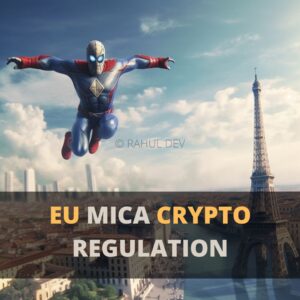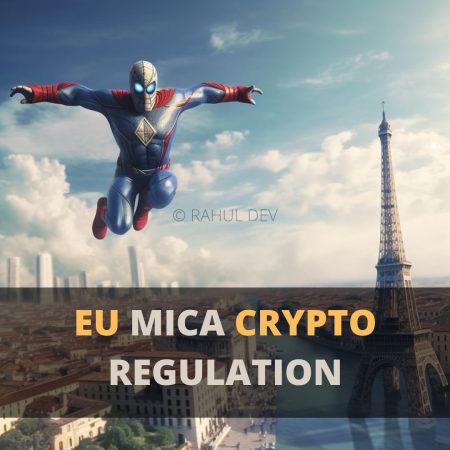The MiCA Regulation is a transformative EU law set to reshape the landscape of cryptocurrencies and other crypto assets. Here we explore its potential impact on crypto asset service providers and investors, and delve into Estonia’s unique position in this regulatory shift. The European Union (EU) has taken a monumental step towards the future of finance, shattering conventional norms and setting the stage for a new era in the blockchain and cryptocurrency space. In an unprecedented move, the EU has approved the Markets in Crypto-Assets (MiCA) regulation, a comprehensive crypto law aimed at providing legal certainty and harmonized rules for the rapidly expanding crypto industry. This remarkable stride towards comprehensive digital asset regulation holds profound implications for the global crypto landscape. Based on the full text of MiCA Regulation, the legal opinion letters can be written with extensive scope during the launch of utility token projects.

The digital asset ecosystem has long been the Wild West of the financial world, with its rapid pace of innovation often outstripping the slow, deliberative process of regulation. The implementation of MiCAsymbolizes a significant shift in the world’s approach to blockchain and cryptocurrency regulation, which could have far-reaching implications for DeFi ventures, decentralized exchanges (DEXs), and the overall growth and dynamism of the crypto industry.
MiCA’s introduction, while revolutionary, also raises pressing questions. How will a one-size-fits-all approach to regulation impact the unique characteristics of decentralized systems? What challenges will smaller DeFi ventures face? How will this law impact the overall innovation in the industry? These are critical questions every blockchain and crypto legal consultant must consider when advising clients in the new regulatory climate.
What is perhaps most striking about MiCA is its potential to deter innovation. Just as traditional finance regulations, like the Dodd-Frank Act, were criticized for stifling innovation, MiCA faces similar backlash. Its one-size-fits-all approach could make it difficult for smaller DeFi ventures to enter the market and dampen the industry’s spirit of innovation. By enforcing a blanket regulation on decentralized networks, the fundamental tenets of DeFi – decentralization, openness, and permissionless finance – could be compromised.
On the other side of the coin, MiCA might lead to an increase in compliance costs for DEXs and DeFi platforms. Just as regulatory compliance in the traditional financial sector has been costly and time-consuming, similar implications are expected in the crypto sector. These increased costs could limit the entry of new players into the market, further stifling competition and innovation.
Privacy concerns also loom large with the introduction of MiCA. The regulation’s requirement for crypto-asset service providers to gather and keep substantial personal data, including users’ identifying information, transaction history, and other sensitive data, could potentially result in privacy violations and increase susceptibility to hacking.
However, despite these concerns, the introduction of MiCA also holds considerable promise. By providing a clear regulatory framework, the EU offers a roadmap for businesses operating in its jurisdiction. The lack of regulatory clarity in the cryptocurrency industry often stalls growth and hinders the adoption of digital assets. With MiCA in place, companies will have a clear understanding of the expected regulations, leading to better protection for crypto investors.
It’s essential to consider the trade-offs involved in balancing different factors when assessing MiCA’s impact. While there are potential challenges associated with this new regulation, it’s crucial to remember that a regulated market also provides a safer environment for consumers and investors. A balanced, well-regulated crypto market could potentially attract more institutional investors, drive wider adoption of cryptocurrencies, and ultimately lead to a more mature, stable crypto industry.
MiCA is indeed a watershed moment for the global crypto industry. By striking a balance between regulation and innovation, the EU has set the stage for the industry’s future. It’s now up to the rest of the world to follow suit and embrace this revolutionary approach to blockchain and cryptocurrency regulation.
As we move forward, there will be a growing demand for skilled blockchain and crypto legal consultants, capable of navigating this new regulatory landscape. They will play a pivotal role in advising companies on the best strategies to comply with these regulations while also maintaining their competitive edge and commitment to innovation.
A recent development worth noting is the proactive response from major players in the crypto space. Binance, one of the world’s largest cryptocurrency exchanges, welcomed the new regulatory landscape, emphasizing the benefits of having clear rules for operating in the EU. Richard Teng, Binance’s Regional Head of Europe and MENA, recently commented, “Businesses like Binance have long been asking for regulatory clarity. Even where there could be disagreements on the details, simply having a settled framework that enables seamless access to one of the world’s largest marketplaces is an enormous opportunity. Having clear rules of the game also creates a level playing field for market participants and enables us to innovate with certainty.”
In conclusion, the introduction of MiCA marks a significant milestone in the history of blockchain and cryptocurrency regulation. It represents a paradigm shift from a largely unregulated market to a more stable, regulated environment. Despite potential challenges, the new regulatory framework also presents opportunities for growth, innovation, and a more mature and stable crypto industry.
The EU’s bold move serves as a beacon for other jurisdictions, illuminating the path towards a balanced approach to blockchain and cryptocurrency regulation. The world is watching, and the next moves will determine the future trajectory of the global crypto industry. This is a story that is still being written, with many more chapters to come.

As a business coach and thought leader, I cannot emphasize enough the importance of innovation, new software patents, mobile apps, and patents for tech companies, startups, and entrepreneurs. The world is rapidly evolving, and staying ahead of the curve is vital for success. Embracing technological advancements such as blockchain and AI can unlock unprecedented opportunities, streamline operations, and propel businesses into the future with competitive valuation via intangible assets.
For instance, blockchain technology can revolutionize supply chain management and secure data sharing wherein innovative business models are explained to the audience via technical whitepapers, while AI can automate and optimize decision-making processes. Mobile apps are no longer just a luxury; they have become essential tools for engaging customers and offering personalized experiences. Furthermore, securing digital innovation patents is crucial for protecting intellectual property, fostering innovation, and maintaining a competitive edge. By investing in these areas, businesses can position themselves as industry pioneers and pave the way for a prosperous future after thoroughly conducting the due diligence and reviewing the legal opinion letters, which in case of digital assets can assist in determining the tokens as utility assets or coins as utility tokens before listing the assets at an exchange.
Our team of advanced patent attorneys assists clients with patent searches, drafting patent applications, and patent (intellectual property) agreements, including licensing and non-disclosure agreements. Advocate Rahul Dev is a Patent Attorney & International Business Lawyer practicing Technology, Intellectual Property & Corporate Laws. He is reachable at rd (at) patentbusinesslawyer (dot) com & @rdpatentlawyer on Twitter.
Quoted in and contributed to 50+ national & international publications (Bloomberg, FirstPost, SwissInfo, Outlook Money, Yahoo News, Times of India, Economic Times, Business Standard, Quartz, Global Legal Post, International Bar Association, LawAsia, BioSpectrum Asia, Digital News Asia, e27, Leaders Speak, Entrepreneur India, VCCircle, AutoTech).
Regularly invited to speak at international & national platforms (conferences, TV channels, seminars, corporate trainings, government workshops) on technology, patents, business strategy, legal developments, leadership & management.
Working closely with patent attorneys along with international law firms with significant experience with lawyers in Asia Pacific providing services to clients in US and Europe. Flagship services include international patent and trademark filings, patent services in India and global patent consulting services.
Global Blockchain Lawyers (www.GlobalBlockchainLawyers.com) is a digital platform to discuss legal issues, latest technology and legal developments, and applicable laws in the dynamic field of Digital Currency, Blockchain, Bitcoin, Cryptocurrency and raising capital through the sale of tokens or coins (ICO or Initial Coin Offerings).
Blockchain ecosystem in India is evolving at a rapid pace and a proactive legal approach is required by blockchain lawyers in India to understand the complex nature of applicable laws and regulations.